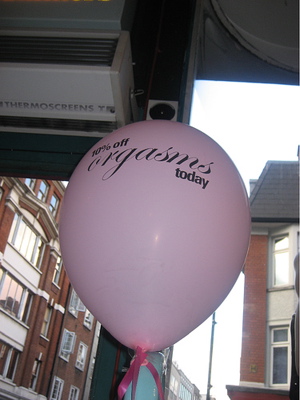Electric flesh-arrows … traversing the body. A rainbow of color strikes the eyelids. A foam of music falls over the ears. It is the gong of the orgasm.? – Anais Nin
Like many sexual discussions which rarely or never happen in the midst of our most intimate relationships, yet proliferate the airwaves and video content of adult entertainment, most people have an extremely limited language to work with when it comes to orgasm. This collective silence about the mystery of orgasm and how it affects our well being and our relationships impacts a stunning percentage of the population. Many studies, including a 2001 global study (30 countries) of sexual behavior with over 27,000 participants reveals that orgasmic dysfunction is more the norm than the exception. One third of all women have never experienced an orgasm and the second third rarely experience orgasm. Orgasmic dysfunction is not just a woman's story; equal numbers of men suffer from a range of issues that hinder their ability to experience orgasm.
The word orgasm is derived from the Greek word orga, which means explosion. This makes sense because the experience of orgasm often feels like a burst of pleasure, bliss, emotional and physical release. In fact, the moment of orgasm creates such a complete letting go, that the brain center that controls anxiety and fear is switched off. Orgasms are as unique as each individual who experiences them. The wide variety of intensity, location and stimulus that contribute to and create orgasm plays a big part of the mystery that many women experience in identifying what an orgasm feels like. Interestingly, studies have found that the confusion about experiencing orgasm goes both ways — some women claim having an orgasm and show no bodily response, while other women who do have classic response like vaginal contractions and heart racing believe that nothing has happened. The modern mythology and (dare I say it, pornography) of orgasm looms so large that many of us are not even sure how to identify our own.
The good news is that the more orgasms you have, the more orgasms you're likely to have in the future. Learning about your own sexual response and developing your orgasmic potential will bring both immediate gratification and long-term satisfaction. As with any skill based human motor function, all bodies come equipped with the tools for orgasm, yet without the proper education and opportunity to practice, many people never successfully achieve the synergy of mind, body and spirit to release this unique and revelatory experience. It is a quest worthy or our time and attention.
The first step on this journey is taking the conversation about sensation, pleasure and orgasm out of the adult entertainment industry and back into the privacy of our bedrooms. This may seem like stating the obvious, but actually intimate sexual conversations are harder than you would think to come by. Your sense of safety in yourself and in your relationship is key to expressing your desires and living in the vulnerable place that opens to sexuality. This is a tall order given the combined impact of the lack of sexual knowledge we're raised with, our shared cultural anxiety, and how little scientific knowledge is available about sexual response.
Orgasm is the human expression of life force and whether you are among the lucky few who know it as the height of intimate relationships or are among the many that are looking for the gate to knowing it better, it is a currency that affects us all.
The Center of Letting Go
"The pleasure of living and the pleasure of the orgasm are identical. Extreme orgasm anxiety forms the basis of the general fear of life."?~ Wilhelm Reich
Everyone wants to orgasm. This is just a fact of life and nature. Long ago, before pornography was everywhere, desire and lust still held a formative place in our human sexuality makeup, we all had a little more room to imagine orgasmic experience and less to compare ourselves to. With the advent of internet pornography, you can witness orgasm on demand, but that doesn't mean you can make yourself, or anyone else have one. Therein lies the conundrum of orgasm.
Of all the coveted human experiences, what makes orgasm so elusive is that it cannot be forced. Even many methods of cajoling seem to backfire. Desperation and orgasm are strange bedfellows. Here we only need to unleash our imagination for a moment and it is clear how much sexual behavior lives in this odd coupling — faking, purchasing, role playing, submitting, dominating, what we will not do for an orgasm is somewhat astounding. Several great sex therapists that I know, tell me that the quest can cost many people their relationship. Orgasm almost becomes the oxymoron in this situation when it is the relationship itself which is given as the fertile ground to grow and nurture the comfort with our sexuality which opens the door to orgasm.
It isn't that surprising then, that statistically, your chances of having an orgasm are much better on your own than with a partner. Letting go of your judgments about sexuality, yours and others is easier to do for many people than digging deep into the fears and insecurities that most of us carry about our sexual history, preferences and behaviors. Many people spend their lives married to people with whom they can't even say the word "masturbate" let alone imagine sharing the act. When we can't disclose our sexuality, it holds both us and our orgasm hostage.
Being able to orgasm with someone, or for that matter by yourself, requires safety. It is the most exciting letting go available to us. Where could we be more vulnerable than in the ecstatic release of one's center? Being able to find a language to explore the kinds of touch that are stimulating, allowing the strange fantasies that lurk in all of us, and letting your body lead you into feelings that you don't and can't control are all essential to experiencing orgasm that transforms.
It doesn't work to focus on orgasm as the finish line. Aiming for it makes the journey anxiety ridden and makes you forget that you are on a journey. Often times it is the smallest of details that can push you to a place that you didn't know was in you. But you can't feel that place if you are looking for something big ahead of you. Presence is nothing if not the key to our sexual selves.
There are probably as many different types of orgasms as there are people who experience them. Great books abound on the many techniques that can facilitate them. Certainly there are literally millions of opportunities to witness them. For me, orgasm is a journey that always brings me back to my center.
Getting There
"Sex pleasure in woman is a kind of magic spell; it demands complete abandon; if words or movements oppose the magic of caresses, the spell is broken."?~ Simone de Beauvoir
Having an orgasm starts with feeling aroused. No arousal, no orgasm. Arousal begins in the brain, specifically the limbic area of the brain where our sense of smell intersects with our emotional process, our memory store and our sexuality. Vibrations of arousal and eventually orgasm live in the body and are triggered in the brain. Trust your sense of smell and indulge your olfactory in whatever scents turn you on. Napoleon was well known for requesting his wife to not wash for a week when he was coming home, whereas for other people Axe body wash is the ultimate in sexy smells, whatever it is know that our olfactory system has always been foundational to the art of mating and use it to your advantage.
Arousal is a visceral experience and bodies are built for motion. Nowhere is this more useful than in sexual exploration. Although this may seem like stating the obvious, it is not a small percentage of people who tense up and stop moving around in their sexual activity. There is more than hip thrusting to experiment with. Experimenting with moving all of your limbs, rolling your neck and stretching into new positions can trigger arousal points that you didn't know you had. If you can think of no other reason than wanting to understand more about your orgasmic potential, try and fit in a little bit of core strengthening exercises into your life. Being able to hold onto someone you love from the inside will make you feel both strong and sexy.
Arousal is expressed through our breathing. Becoming aware of breath in sexuality will bring life and orgasm into focus like nothing else. Whether you tend towards long and slow breaths or short, fast inhalations, stop and notice how your breathing affects your connection to your body, your lover and your orgasmic possibilities. Try changing your breathing pattern and see how it transforms the experience. Making an agreement with your partner to synchronize your breathing and movement is a remarkably simple step which has profound impact on lovemaking. Refocusing your breathing will not only deepen your connection, but may also expand your idea of orgasm.
Extending the space between arousal and orgasm is the art of lovemaking. Do your own solo experiments so you know the sensations and buildup that lead you to the point of no return. Practice pulling back from that line and introducing another form of touch or breath and move towards it again. I have long been an advocate of waiting as long as you can to surrender into your orgasm. The longer you wait, the more power and energy is built up and the sweeter the release. Some spiritual techniques suggest moving up and down this arousal tunnel, coming close as you can to your orgasmic edge without going over as a spiritual practice. Sounds like a worthy form of meditation, and I don't question it's incredibly powerful results.
Arousal messages come through our body as genital secretions. As many as a third of all women do not have a strong natural lubricating response. This easily turns into feelings of low libido and disinterest in sex. After years of birthing and nursing babies, I never have natural wetness so I was heartened to discover that a small application of great, clean lubricant will kick start the arousal cycle as well as my memory of natural lubrication did. Not only that, but adding healthy lubricant ingredients ensures painless friction, more time to experiment and is a critical companion to experiencing orgasm. I would be hard pressed to not admit to making the best lubricant on the market, but many people enjoy other types of lubricants — so find what is best for your body.
Fantasy can either be helpful or harmful to your orgasmic journey. Having fantasies that conjure up guilt and take you out of your physical experience and away from your partner are generally not going to move you closer to orgasm. However, imagining other illicit relationships for you and your partner, and here, you only need to read a small bit of sexual history, can be seriously passion producing. I can never repeat the strange and fantastical thoughts that go through my head afterwards, but as I have come to bear witness to them, I have experienced whole new levels in my orgasmic potential.
So go forth, flirt with arousal, don't judge your experience or compare it to anyone else's and enjoy the ride. If there is any journey worth taking over and over again, it is the one to our most innate and miraculous human pleasure.
Extending Life and Love
"It is precisely because our present life is so inseparably linked with desire that we must make use of desire's tremendous energy if we wish to transform our life into something transcendental."?~ Introduction to Tantra
Having regular orgasms will extend your life and provide the basis for more long lasting relationships. Recent studies have confirmed the link between longevity and orgasm frequency. We know that people who enjoy a regular, satisfying sex life (i.e., regular orgasms) are less stressed, less depressed and generally more well physically, mentally and emotionally. This level of satisfaction and well being is reflected in the partnerships in which they are shared. The depth of connection and the bonds of trust that shared orgasmic experiences builds into a relationship is a visceral insurance policy for long term commitments.
The majority of people who leave their relationships cite sexual incompatibility as a primary impetus to leave. It is so common as to be cliché that many people in long term relationships reach an impasse of sorts about their individual and connected sex drives. The pulley of sexual attraction and arousal is not static; the swing between feeling desirable and connected in a relationship is in continuous flux and reflects the health of the entire relationship, not just its sexual side. Overcoming the initiation argument begins when both people stop keeping score. Agreeing to harness the frustration and apply it towards building solutions is much more likely to move you towards shared pleasure. ??
One of the most common blocks to a shared orgasmic experience is the strangely common practice of faking orgasm. Studies site as many as 60% of women have faked an orgasm and this practice is not limited only to women. The reasons for faking orgasm are complex. Whether it is because you feel like you can't perform, or that you can't open up to that level of vulnerability or that by faking you feel like you can end the intimacy, what results is the most serious of breaches in trust. Faking orgasm is a lie and it leads the person who is trying to love you and bring you pleasure to feeling like s/he cannot trust the messages s/he is hearing. Breaching trust at this deeply naked level of vulnerability cannot help but seep into the other aspects of the relationship. ??
Many women mistakenly believe that their pleasure doesn't matter, or they don't want to burden their partner in their own frustrated search for that mysterious and powerful orgasmic release. Real conversation about these issues is sexy. It communicates that you are invested and trust your partner enough to be vulnerable about this most deeply held desire. Just for the record, most men get more pleasure and sense of mastery from helping a woman they love to orgasm than their own climax. Working together to find the path to individual orgasm is the most intimate sharing that exists. It changes everything in a relationship. ??
Finding a language to talk about your sexuality is the stumbling block for most people. It is one area in life where taking responsibility for the problem is shaming, so we often go into a default mode of blaming. With that slip, it is easy to believe that change is impossible and to feel caught in a no-win situation. As in any other area of personal development, clarity is everything. Take the time to think about or write down your own personal sexual history including orgasmic experience. Share these notes with your partner and often even unwilling partners will often begin to open up. Set a couple of shared goals, mysterious as our sexual selves may be, they respond to dialogue as any other part of our life. For many couples making efforts to de-stress their lives can have remarkable effects on their ability to be intimate.
Discovering pleasure together is like pouring cement into a foundation. Physical touch that leads to ecstatic release not only releases hormones and endorphins that promote health and longevity, but also serve as the basis of biological bonding. Knowing that you have the ability to reach someone in this most intimate of ways is one of the most significant sources of self esteem that relationships afford. There is a strange coincidence between the percentages of people who don't orgasm and the percentage of people who divorce. While sharing orgasm is not enough to keep a relationship alive, the inability to move towards it is enough to kill it. There is no other single work in life that will repay you so profoundly each and every time you share it.
Image by mondoagogo., courtesy of a Creative Commons license.















